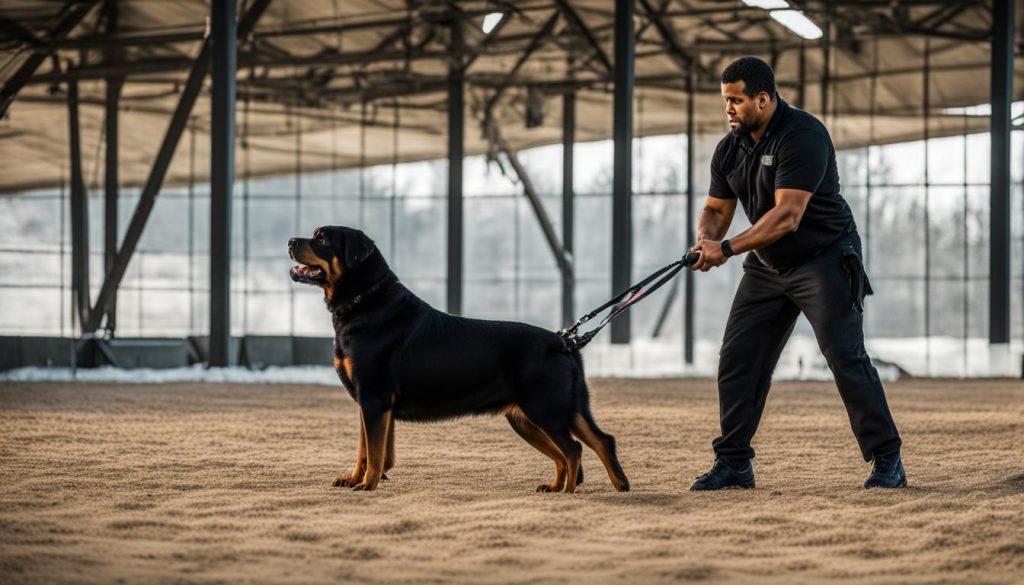The Rottweiler is a fascinating breed known for its strong temperament and distinctive personality traits. With their solid strength and powerful presence, Rottweilers exude confidence and loyalty. Let’s explore the key characteristics and behaviors that make Rottweilers so unique.
Key Takeaways:
- Rottweilers are known for their solid strength and powerful presence.
- They have a moderate energy level and require at least 40 minutes of exercise per day.
- Rottweilers are recognized by the American Kennel Club (AKC) as a working class dog and the United Kennel Club (UKC) as a guardian dog.
- Socialization and training are essential for Rottweilers to prevent aggression and dominance.
- Rottweilers are loyal, loving, and protective, making them excellent companions.
History of the Rottweiler

The Rottweiler has a rich history that dates back to ancient times. This breed of dog accompanied the Romans through Germany, serving as working dogs. They were responsible for driving cattle and guarding outposts. As the Romans moved on, many Rottweilers were left behind in the town of Rottweil in southern Germany, where they eventually became the breed we know today.
During the Middle Ages, Rottweilers were used for various tasks. They were skilled at driving cattle to market, pulling carts, and guarding homesteads. In fact, they were even used to carry money in money belts tied around their necks. However, by the late 1800s, the breed was almost extinct. Thankfully, dedicated breeders took action to revive the Rottweiler, and their efforts were successful.
Today, Rottweilers are one of the most popular breeds in the United States. They are recognized for their solid strength, powerful presence, and loyal nature. Rottweilers continue to showcase their working dog heritage, excelling in various tasks and roles such as search and rescue, therapy work, and service dog duties.
Rottweiler Breed Development
The development of the Rottweiler breed involved careful selection and breeding of dogs with desirable traits. Responsible breeders focused on creating dogs with stable temperaments, good health, and proper socialization. This ensured that each new generation of Rottweilers retained the breed’s distinctive characteristics while avoiding genetic health issues and temperament problems.
Breed development also aimed to preserve and improve the Rottweiler’s working ability, intelligence, and overall functionality. A well-bred Rottweiler should possess the strength and endurance necessary for their historical working roles, while also being adaptable to modern lifestyles.
Through responsible breeding practices, the Rottweiler has evolved into a versatile and resilient breed, highly regarded for its loyalty, protective nature, and companionship. These dogs continue to leave their mark on history, making a positive impact in various fields and enriching the lives of their owners.
Rottweiler Personality Traits

Rottweilers have a unique blend of personality traits that make them stand out among other dog breeds. These traits play a significant role in defining their temperament and behavior. Understanding the key characteristics of Rottweilers can help potential owners make an informed decision about whether this breed is the right fit for their lifestyle and needs.
Rottweiler Intelligence and Independence
One notable personality trait of Rottweilers is their intelligence. They are highly trainable and quick to learn, which makes them suitable for various activities and tasks. However, Rottweilers also possess a level of independence. While this independence showcases their confidence, it can sometimes result in stubbornness. It is important for Rottweiler owners to establish themselves as strong leaders and provide consistent guidance to ensure their dog’s obedience and well-being.
Rottweiler Loyalty and Protective Instincts
Rottweilers are known for their loyalty and strong protective instincts. Once they form a bond with their family, they will go to great lengths to protect and defend them. This protective nature, along with their imposing size and intimidating appearance, makes Rottweilers excellent guard dogs. However, it is crucial for owners to properly socialize their Rottweilers from a young age and teach them appropriate behaviors to prevent aggression towards strangers or other animals.
“Rottweilers have a unique blend of intelligence, independence, loyalty, and protective instincts that make them exceptional companions for the right owners.”
Rottweiler Confidence and Fearlessness
Rottweilers are confident and fearless dogs. They have a self-assured demeanor and will not shy away from challenging situations. This confidence, paired with their natural strength and physical abilities, makes them well-suited for jobs that require courage and unwavering determination. However, it is important for owners to channel this confidence into positive outlets through training and structured activities to ensure a well-rounded Rottweiler.
| Rottweiler Personality Traits | Description |
|---|---|
| Intelligence | Rottweilers are highly intelligent and trainable dogs. |
| Loyalty | Rottweilers form strong bonds with their families and are fiercely loyal. |
| Protectiveness | Rottweilers have a strong protective instinct and will guard their loved ones. |
| Confidence | Rottweilers are confident and fearless, approaching challenges with assurance. |
Overall, Rottweilers have a complex array of personality traits that require responsible ownership, proper training, and socialization. With the right guidance and environment, Rottweilers can be loving, loyal, and exceptional companions for individuals and families alike.
Rottweiler Temperament
The temperament of a Rottweiler is characterized by their calm and levelheaded nature. They are generally not easily flustered or agitated, remaining composed in most situations. This makes them excellent guard dogs, as they are cautious and reserved with strangers. Rottweilers are known for their loyalty and deep attachment to their families, often displaying affectionate and gentle behavior. They enjoy spending time cuddling and playing with their loved ones.
When properly socialized from a young age, Rottweilers are generally good with children. They can be patient and gentle, making them suitable companions for families. However, it is important to note that Rottweilers have a strong protective instinct. If they perceive their loved ones to be in danger, they will not hesitate to defend them. This protective nature is a characteristic that many Rottweiler owners value in their pets.
To summarize, Rottweilers have a calm and levelheaded temperament. They are cautious with strangers, making them great guard dogs. With proper socialization, they can be gentle and patient with children. Rottweilers are loyal and protective, always ready to defend their loved ones when needed.
Rottweiler Temperament Summary
- Rottweilers have a calm and levelheaded temperament.
- They are cautious and reserved with strangers, making them excellent guard dogs.
- With proper socialization, Rottweilers can be gentle and patient with children.
- Rottweilers are loyal and protective, always ready to defend their loved ones.
Table: Rottweiler Temperament Traits
| Trait | Description |
|---|---|
| Calm and Levelheaded | Rottweilers are generally composed and not easily agitated. |
| Cautious with Strangers | They exhibit reserved behavior towards unfamiliar individuals. |
| Gentle with Children | When properly socialized, Rottweilers can be patient and gentle with kids. |
| Loyal and Protective | Rottweilers have a strong protective instinct and are fiercely loyal to their families. |
Rottweiler Aggression

Rottweilers are often associated with aggression, but it is important to understand that not all Rottweilers are aggressive. Aggression in Rottweilers can be a result of various factors such as poor breeding, lack of socialization, or mistreatment. Early socialization and proper training play a crucial role in preventing aggression in Rottweilers.
It is essential for owners to establish themselves as the pack leaders and provide consistent and positive reinforcement training. By setting clear rules and boundaries, Rottweilers can learn to understand their role in the household and interact appropriately with people and other animals. Responsible ownership and a firm, patient hand are key to managing and preventing aggression in Rottweilers.
If you notice any signs of aggression in your Rottweiler, it is important to address them promptly and seek professional help if needed. Aggressive behavior in Rottweilers can be dangerous due to their size and strength. Consulting with a professional dog trainer or behaviorist can provide valuable guidance in managing and modifying aggressive tendencies.
Common Signs of Aggression in Rottweilers:
- Growling and snarling
- Show of teeth
- Stiff body posture
- Intense staring
- Snapping or biting
It is important to remember that aggression in Rottweilers is not a breed characteristic but rather a behavior that can be influenced by various factors. Responsible ownership, early socialization, and proper training can help ensure that your Rottweiler develops into a well-behaved and balanced companion.
Tips for Raising a Happy Rottweiler

To raise a happy and well-adjusted Rottweiler, proper care and training are crucial. Start socializing your Rottweiler from a young age, exposing them to various people, animals, and environments. This early socialization helps them become well-rounded and confident individuals. Introduce them to different sights, sounds, and experiences to help reduce fear and aggression later in life.
Obedience training is essential for a Rottweiler’s development. Use positive reinforcement techniques to teach your Rottweiler basic commands and good behavior. Reward them with treats, praise, and affection when they exhibit the desired behavior. Consistency and patience are key when training a Rottweiler, as they can be strong-willed. Establish yourself as the pack leader and set consistent rules and boundaries to provide structure and guidance.
Physical and mental stimulation are vital for a happy Rottweiler. Ensure they receive regular exercise to burn off their energy. Rottweilers are a working breed and thrive when given jobs or tasks to complete. Engage them with interactive toys, puzzle games, and obedience training sessions to keep their minds sharp and prevent boredom. Mental stimulation helps prevent destructive behaviors and promotes a well-balanced personality.
| Rottweiler Care Tips | Rottweiler Training Tips |
|---|---|
|
|
“Proper care, socialization, and training are key factors in raising a happy and well-behaved Rottweiler.” – Professional Dog Trainer
By following these tips and providing your Rottweiler with the care, training, and stimulation they need, you can ensure they live a happy and fulfilling life. Remember to be a loving and responsible owner, and your Rottweiler will reward you with loyalty and companionship.
Rottweiler Myths and Misconceptions

As a professional journalist and Rottweiler enthusiast, I have come across many myths and misconceptions surrounding this breed. It is essential to separate fact from fiction when discussing Rottweiler personality traits and behavior. By debunking these myths, we can promote a better understanding of Rottweilers and encourage responsible ownership.
Myth 1: All Rottweilers are aggressive and dangerous.
The truth is, not all Rottweilers are aggressive. Aggression in any dog breed can occur due to various factors such as poor breeding, lack of socialization, or mistreatment. With proper training, socialization, and a loving environment, Rottweilers can be friendly, well-mannered, and loyal companions. It is important to remember that individual dogs have their unique personalities and should not be judged solely based on their breed.
Myth 2: Rottweilers are not good with children.
This myth is far from the truth. Rottweilers, when raised with proper socialization and training, can be gentle and patient with children. Like any dog breed, supervision and guidance are crucial when interacting with young children. By teaching children how to appropriately approach and interact with dogs, the bond between a Rottweiler and a child can be nurturing and affectionate.
“Responsible ownership, proper care, socialization, and training are essential to ensure the development of a well-rounded and happy Rottweiler.”
Myth 3: Rottweilers are inherently vicious guard dogs.
While it is true that Rottweilers possess protective instincts, it does not mean they are vicious by nature. With proper training, Rottweilers can become excellent guard dogs who know when and how to protect their families. However, responsible ownership is crucial in preventing aggression from escalating into dangerous behavior.
By dispelling these myths and misconceptions, we can appreciate the true nature of Rottweilers and promote responsible ownership. It is important to remember that every individual dog is unique and should be treated with love, respect, and understanding.
The Role of Responsible Breeding in Rottweiler Personality

Responsible breeding plays a crucial role in shaping the temperament and behavior of Rottweilers. Breeders who prioritize the well-being and welfare of the breed focus on breeding Rottweilers with stable temperaments and good health. They ensure that each puppy is matched with the right home and provided with a solid foundation for a well-rounded personality.
By selecting breeding pairs with desirable traits, responsible breeders work towards preserving and improving the breed’s characteristics. They carefully consider the lineage and health history of the dogs they breed, aiming to avoid genetic health issues and temperament problems. This thorough approach helps maintain the overall health and temperament of Rottweilers.
When Rottweilers are bred responsibly, they are more likely to have predictable and well-adjusted temperaments. This is important for both the dog and its owners, as it helps create a harmonious and fulfilling relationship. Responsible breeders understand the importance of temperament in the breed and take the necessary steps to produce Rottweilers that are stable, trainable, and have the desired traits.
The Benefits of Responsible Breeding
By engaging in responsible breeding practices, breeders contribute to the overall well-being of the Rottweiler breed. Some of the benefits of responsible breeding include:
- Reduced risk of genetic health issues: Responsible breeders conduct health screenings on their breeding dogs to ensure they are free from genetic diseases that can be passed on to their offspring. This helps reduce the risk of health problems in Rottweilers.
- Consistent temperaments: Responsible breeders select breeding pairs with desirable temperaments, resulting in Rottweilers that are more likely to have consistent and predictable personalities.
- Improved breed standards: Responsible breeders work towards preserving and improving the breed’s characteristics, ensuring that Rottweilers adhere to the established breed standards set by kennel clubs.
- Support for the breed community: Responsible breeders are actively involved in the Rottweiler community, sharing knowledge and resources to help promote the well-being of the breed.
Overall, responsible breeding plays a vital role in maintaining the desirable temperament and behavior of Rottweilers. It ensures that future generations of Rottweilers continue to possess the qualities that make them beloved companions and working dogs.
| Benefits of Responsible Breeding | Description |
|---|---|
| Reduced risk of genetic health issues | Responsible breeders conduct health screenings to prevent genetic diseases from being passed on. |
| Consistent temperaments | Responsible breeders select breeding pairs with desirable temperaments, resulting in consistent personalities. |
| Improved breed standards | Responsible breeders work towards preserving and improving the breed’s characteristics while adhering to established breed standards. |
| Support for the breed community | Responsible breeders actively participate in the Rottweiler community, sharing knowledge and resources to benefit the breed. |
Responsible breeding is essential for ensuring the long-term health and well-being of Rottweilers. By selecting breeding pairs carefully and prioritizing the breed’s welfare, responsible breeders contribute to the development of Rottweilers with the desired temperament, behavior, and overall quality.
Rottweiler Personality Development: The Importance of Socialization and Training

Rottweilers are known for their unique blend of personality traits, including loyalty, protectiveness, and intelligence. However, to ensure the development of a well-rounded and happy Rottweiler, early socialization and training are crucial. Socialization involves exposing your Rottweiler to various people, animals, and environments from a young age. This helps them become confident and well-adjusted individuals, reducing the likelihood of fear or aggression later in life.
During the socialization process, it is important to provide positive experiences and reinforce good behavior. Encourage your Rottweiler to interact with different people, including children, and expose them to various situations such as walks in the park, visits to the vet, and outings in the car. This helps them become accustomed to different stimuli and builds their trust and confidence.
Training is also a vital component of personality development in Rottweilers. Obedience training, using positive reinforcement techniques, helps establish boundaries and teaches your Rottweiler basic commands. This not only ensures their safety but also helps them understand their role and responsibilities within the household. Consistent and positive reinforcement training methods, such as rewarding good behavior with treats or praise, build a strong bond between you and your Rottweiler, enhancing their trust, respect, and overall personality.
Benefits of Early Socialization and Training:
- Reduced risk of fear and aggression
- Increased confidence and adaptability
- Better responsiveness to commands and cues
- Improved sociability with people and other animals
- Enhanced problem-solving skills and mental stimulation
By prioritizing early socialization and training, you are laying the foundation for a well-behaved and well-adjusted Rottweiler. Remember, consistency, patience, and positive reinforcement are key when training your Rottweiler, and seeking the guidance of a professional dog trainer can be beneficial, especially if you are a first-time Rottweiler owner. With the right approach, you can help your Rottweiler develop into a happy, confident, and well-mannered companion.
| Personality Development Factors | Effect |
|---|---|
| Early Socialization | Reduces fear and aggression |
| Positive Reinforcement Training | Establishes boundaries and builds trust |
| Exposure to Various Stimuli | Increases adaptability and sociability |
The Benefits of Owning a Rottweiler
Owning a Rottweiler can bring numerous benefits to your life. These loyal and affectionate dogs make excellent companions and are deeply attached to their families. Their protective nature provides a sense of security and peace of mind, knowing that they will always be there to watch over you and your loved ones. Rottweilers are known for their unwavering loyalty, forming strong bonds with their owners and becoming an integral part of the family.
Rottweilers excel at companionship and are always eager to be by your side. Whether you’re going for a hike, playing in the park, or simply relaxing at home, these dogs will be your constant and faithful companions. Their loving nature and affectionate demeanor make them great cuddle buddies, always ready to offer comfort and warmth. Rottweilers are especially known for their gentle and patient behavior around children, making them an ideal choice for families.
“Having a Rottweiler in my life has been an incredibly rewarding experience. Their loyalty and companionship are unmatched, and they bring so much joy and love into my home. I always feel safe and protected with my Rottweiler by my side, and the bond we share is truly special.” – Rottweiler owner
In addition to their companionship and loyalty, Rottweilers are intelligent and highly trainable. They thrive on mental stimulation and excel in various activities and sports, such as obedience training, agility, and even therapy work. With their strong work ethic and eagerness to please, Rottweilers are always up for a challenge and are quick to learn new skills. Engaging their minds and providing them with tasks or jobs helps keep them mentally stimulated and fulfilled.
Wrapping Up
To summarize, the Rottweiler is a remarkable breed with a well-balanced personality. Their loyalty, affection, and protective nature make them excellent family dogs and companions. However, responsible ownership is crucial in order to raise a happy and well-adjusted Rottweiler.
Proper care, including regular exercise, socialization, and training, is essential to ensure the development of a well-rounded Rottweiler. By providing a nurturing environment and establishing yourself as the pack leader, you can help your Rottweiler thrive and bring joy to your life.
In summary, the Rottweiler’s personality can be described as confident, intelligent, and independent. They require guidance, structure, and mental stimulation to prevent any potential aggression. With the right training and socialization, Rottweilers can be gentle, patient, and loving companions. Understanding their unique blend of traits and meeting their needs will lead to a fulfilling relationship with your Rottweiler.
FAQ
Are Rottweilers aggressive by nature?
Not all Rottweilers are aggressive. Aggression can result from poor breeding, lack of socialization, or mistreatment. Early socialization and proper training are essential to prevent aggression in Rottweilers.
Are Rottweilers good with children?
With proper socialization and training, Rottweilers can be gentle and patient with children. However, supervision and guidance are important to ensure the safety of both the child and the dog.
How much exercise do Rottweilers need?
Rottweilers have a moderate energy level and require at least 40 minutes of exercise per day. This can include activities such as walks, playtime, and mental stimulation.
Do Rottweilers shed a lot?
Rottweilers have a short, dense double coat that sheds moderately. Regular brushing can help minimize shedding and keep their coat in good condition.
How long do Rottweilers live?
Rottweilers have an average lifespan of 8-11 years. Proper care, diet, and regular vet check-ups can contribute to their overall health and longevity.
Can Rottweilers be left alone for long periods?
Rottweilers are social dogs and thrive on human companionship. Leaving them alone for long periods can lead to boredom and potential behavioral issues. It is important to provide them with mental stimulation and regular exercise, and proper arrangements should be made if they need to be left alone for extended periods.
Do Rottweilers require a lot of grooming?
Rottweilers have minimal grooming needs. Regular brushing, occasional bathing, and proper dental care are usually sufficient to keep their coat and skin healthy. Additionally, routine nail trimming and ear cleaning should be part of their grooming routine.
Can Rottweilers be trained to be obedient?
Yes, Rottweilers are intelligent and trainable dogs. They respond well to positive reinforcement training methods and can learn various commands and cues. Consistency, patience, and firm but fair training techniques are key to their success.
Are Rottweilers good guard dogs?
Yes, Rottweilers have a strong protective instinct and can make excellent guard dogs. They are naturally wary of strangers and will alert their owners to any potential threats. Proper training and socialization are crucial to ensure their protective behavior is well-directed and controlled.
Do Rottweilers get along with other dogs?
Rottweilers can get along well with other dogs if properly socialized from a young age. However, some Rottweilers can be more dominant or aggressive towards same-sex dogs, particularly males. Early socialization, supervision, and appropriate introductions are important for successful dog-to-dog interactions.






